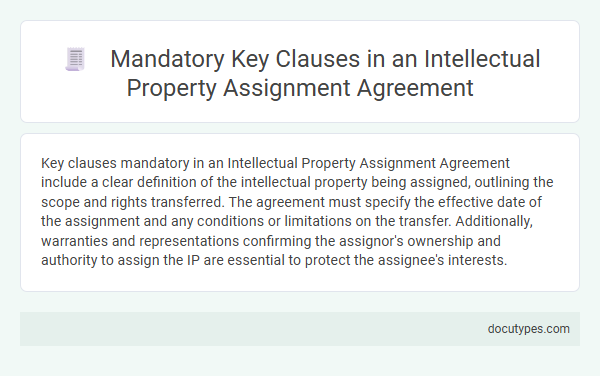Key clauses mandatory in an Intellectual Property Assignment Agreement include a clear definition of the intellectual property being assigned, outlining the scope and rights transferred. The agreement must specify the effective date of the assignment and any conditions or limitations on the transfer. Additionally, warranties and representations confirming the assignor's ownership and authority to assign the IP are essential to protect the assignee's interests.
Definition and Identification of Intellectual Property
Defining and identifying Intellectual Property (IP) precisely is essential in an Intellectual Property Assignment Agreement. Clear delimitation ensures rights are transferred without ambiguity.
- Definition of Intellectual Property - This clause explicitly outlines types of IP involved, such as patents, trademarks, copyrights, and trade secrets.
- Identification of Assigned IP - Specifies the exact creations, registrations, or applications subject to assignment, avoiding future disputes.
- Inclusion of Existing and Future IP - Addresses rights to both current IP and any that may be developed during the agreement term, securing comprehensive transfer.
You must ensure these clauses are comprehensively drafted to protect your rights and obligations effectively.
Assignment of Rights and Scope of Transfer
The assignment of rights clause is fundamental in an Intellectual Property Assignment Agreement, clearly specifying the transferor's intent to assign all relevant IP rights to the assignee. This clause must detail the exact rights being transferred, including patents, copyrights, trademarks, or trade secrets.
The scope of transfer clause defines the extent and limitations of the assigned intellectual property rights. It specifies whether the transfer is exclusive or non-exclusive, territorial limits, and any residual rights retained by the assignor.
Representations and Warranties of the Assignor
Key clauses in an Intellectual Property Assignment Agreement ensure clear transfer of rights and protect all parties involved. Representations and warranties of the assignor are crucial to confirm ownership and the status of the intellectual property being assigned.
- Ownership Warranty - The assignor guarantees full legal ownership of the intellectual property being transferred.
- No Encumbrances - The assignor assures that the intellectual property is free from liens, claims, or any third-party rights.
- Authority to Assign - The assignor confirms they have full authority to enter into the agreement and assign the rights to You.
Consideration and Payment Terms
Consideration is a fundamental clause in an Intellectual Property Assignment Agreement, ensuring that the transfer of rights is supported by something of value, which legally validates the contract. This clause outlines what the assignee will provide in exchange for the intellectual property, such as monetary compensation or other benefits.
The Payment Terms section specifies the schedule, method, and conditions under which payments must be made to the assignor. Clear payment terms protect Your financial interests and help prevent disputes by defining how and when consideration is fulfilled.
Moral Rights Waiver and Consent
What key clauses are mandatory in an Intellectual Property Assignment Agreement regarding moral rights waiver and consent? A clear moral rights waiver must be included to ensure the assignor relinquishes all claims to attribution and integrity rights. Your explicit consent to this waiver protects the assignee from future disputes related to moral rights.
Confidentiality and Non-Disclosure Obligations
Confidentiality and Non-Disclosure Obligations are fundamental clauses in an Intellectual Property Assignment Agreement. These provisions ensure that sensitive information related to the assigned intellectual property remains protected.
- Confidential Information Definition - This clause clearly defines what constitutes confidential information, including trade secrets, technical data, and proprietary materials.
- Non-Disclosure Requirement - Parties agree not to disclose any confidential information to unauthorized third parties during and after the term of the agreement.
- Duration of Confidentiality - The agreement specifies how long the confidentiality obligations will remain in effect, often extending beyond the termination of the contract.
Governing Law and Jurisdiction
Governing law and jurisdiction clauses are mandatory in an Intellectual Property Assignment Agreement to determine which legal system will apply and where disputes will be resolved. These clauses provide clarity and predictability, minimizing conflicts and legal uncertainties related to intellectual property rights. You must carefully specify these terms to ensure enforceability and protect your interests throughout the agreement's duration.
Indemnification and Liability Limitation
| Key Clause | Description | Importance in Intellectual Property Assignment Agreement |
|---|---|---|
| Indemnification | This clause requires the assignor to protect the assignee from any third-party claims or damages related to the intellectual property being assigned. It typically covers legal costs, damages, and settlements arising from infringement or ownership disputes. | Essential for shifting risk and ensuring the assignee is not financially burdened by legal liabilities connected to the assigned intellectual property. It safeguards the assignee's investment and use rights. |
| Liability Limitation | This clause limits the amount or types of damages either party can recover under the agreement. It often sets caps on monetary liability and excludes certain types of damages, such as consequential or incidental damages. | Protects both parties by defining financial exposure related to the assignment. It helps manage post-assignment risks and ensures predictable liabilities for assignor and assignee. |
Further Assurances and Cooperation
Further Assurances and Cooperation clauses are mandatory in an Intellectual Property Assignment Agreement to ensure the assignor actively supports the assignee in securing IP rights. These provisions require you to provide necessary documents, execute additional instruments, and assist in legal proceedings if needed. This collaboration guarantees smooth transfer and enforcement of intellectual property rights under the agreement.
What Key Clauses Are Mandatory in an Intellectual Property Assignment Agreement? Infographic

